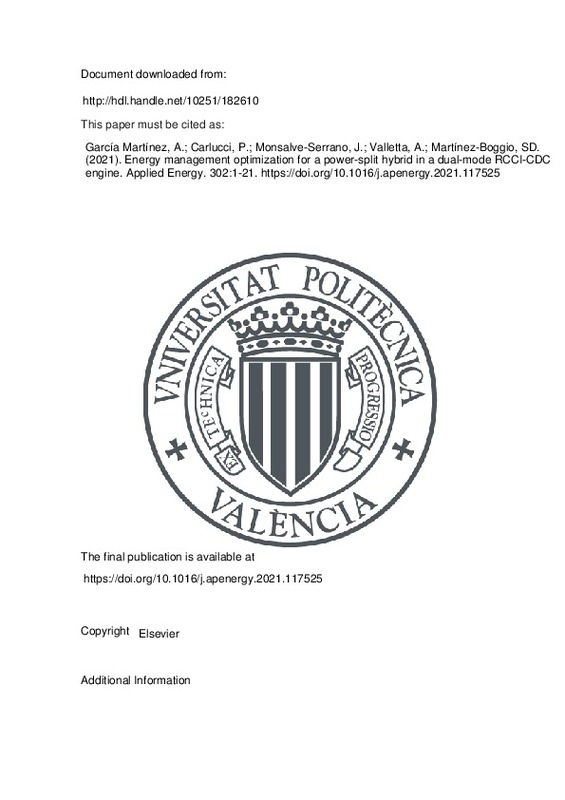JavaScript is disabled for your browser. Some features of this site may not work without it.
Buscar en RiuNet
Listar
Mi cuenta
Estadísticas
Ayuda RiuNet
Admin. UPV
Energy management optimization for a power-split hybrid in a dual-mode RCCI-CDC engine
Mostrar el registro sencillo del ítem
Ficheros en el ítem
| dc.contributor.author | García Martínez, Antonio
|
es_ES |
| dc.contributor.author | Carlucci, Paolo
|
es_ES |
| dc.contributor.author | Monsalve-Serrano, Javier
|
es_ES |
| dc.contributor.author | Valletta, Andrea
|
es_ES |
| dc.contributor.author | Martínez-Boggio, Santiago Daniel
|
es_ES |
| dc.date.accessioned | 2022-05-13T18:06:12Z | |
| dc.date.available | 2022-05-13T18:06:12Z | |
| dc.date.issued | 2021-11-15 | es_ES |
| dc.identifier.issn | 0306-2619 | es_ES |
| dc.identifier.uri | http://hdl.handle.net/10251/182610 | |
| dc.description.abstract | [EN] The electrification of propulsion systems in light passenger vehicles is essential to reach the objectives set by the different organizations that protect the environment. However, due to various aspects such as politician decisions, bad press, high powertrain production costs and a moderate reduction in energy consumption, purely electric vehicles are being a priority for several car manufacturers as well as for governments instead of hybrid vehicles. This article shows how hybrid electrification, using a low temperature combustion engine, is capable of reducing the energy consumption while drastically minimizing the particle matter (mainly soot) and NOx emissions, in a power split propulsion system. This is possible by means of a precise control of the operating conditions of the engine. To operate in the hybrid powertrain efficiently and with low emissions, several energy managements controller strategies are studied. In this work, adaptive Equivalent Minimization Control Strategy (ECMS) and Rule-Based Control (RBC) are used as online controller, and the dynamic programming optimal control is used to size the powertrain. In this sense, the electric machine maximum power, battery energy content, power split device gear ratio as well as the control parameter are studied. Both emissions and fuel consumption are included in the optimization function. The results show that it is possible to reduce the fuel consumption by 17.5% with an energy minimization-oriented strategy. In addition, ECMS is more effective to control both emissions and fuel economy. If a double target is applied, the fuel consumption is reduced to 5% while achieving Euro 6 emissions levels without the need for NOx and particulate matter aftertreatment systems. This strongly reduces the total cost of the propulsion system compared to a conventional vehicle, thus compensating the cost increase due to the hybridization without considering the fuel saving costs. | es_ES |
| dc.description.sponsorship | The authors acknowledge the Conselleria de Innovacion, Universidades, Ciencia y Sociedad Digital de la Generalitat Valenciana for partially supporting this research through grant number GV/2020/017 | es_ES |
| dc.language | Inglés | es_ES |
| dc.publisher | Elsevier | es_ES |
| dc.relation.ispartof | Applied Energy | es_ES |
| dc.rights | Reconocimiento - No comercial - Sin obra derivada (by-nc-nd) | es_ES |
| dc.subject | RCCI | es_ES |
| dc.subject | Energy management | es_ES |
| dc.subject | ECMS | es_ES |
| dc.subject | Hybrid powertrain | es_ES |
| dc.subject | Emissions regulations | es_ES |
| dc.subject.classification | MAQUINAS Y MOTORES TERMICOS | es_ES |
| dc.title | Energy management optimization for a power-split hybrid in a dual-mode RCCI-CDC engine | es_ES |
| dc.type | Artículo | es_ES |
| dc.identifier.doi | 10.1016/j.apenergy.2021.117525 | es_ES |
| dc.relation.projectID | info:eu-repo/grantAgreement/GVA//GV%2F2020%2F017 / | es_ES |
| dc.relation.projectID | info:eu-repo/grantAgreement/GENERALITAT VALENCIANA//GV%2F2020%2F062//POTENCIAL DEL USO DE E-FUELS EN PLANTAS PROPULSIVAS HIBRIDAS COMO VIA DE REDUCCION DE LAS EMISIONES DE CO2 DEL SECTOR TRANSPORTE/ | es_ES |
| dc.rights.accessRights | Abierto | es_ES |
| dc.contributor.affiliation | Universitat Politècnica de València. Departamento de Máquinas y Motores Térmicos - Departament de Màquines i Motors Tèrmics | es_ES |
| dc.description.bibliographicCitation | García Martínez, A.; Carlucci, P.; Monsalve-Serrano, J.; Valletta, A.; Martínez-Boggio, SD. (2021). Energy management optimization for a power-split hybrid in a dual-mode RCCI-CDC engine. Applied Energy. 302:1-21. https://doi.org/10.1016/j.apenergy.2021.117525 | es_ES |
| dc.description.accrualMethod | S | es_ES |
| dc.relation.publisherversion | https://doi.org/10.1016/j.apenergy.2021.117525 | es_ES |
| dc.description.upvformatpinicio | 1 | es_ES |
| dc.description.upvformatpfin | 21 | es_ES |
| dc.type.version | info:eu-repo/semantics/publishedVersion | es_ES |
| dc.description.volume | 302 | es_ES |
| dc.relation.pasarela | S\444737 | es_ES |
| dc.contributor.funder | GENERALITAT VALENCIANA | es_ES |







![[Cerrado]](/themes/UPV/images/candado.png)

